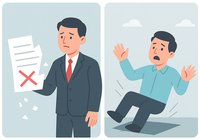| Phrasal verb | Main meaning |
|---|---|
fall over [fɔːl ˈəʊvə] | to lose balance and collapse to the ground |
Other meanings
- to stop working (machines, systems)
- to fail suddenly (business, plan)
- to be overly eager or excessively willing
Example Sentences Using the Phrasal Verb "fall over"
- She tripped on the step and fell over.
- The old computer fell over during the presentation.
- Their business fell over after just two years.
- He was falling over himself to impress the new boss.
Features of Using "fall over"
This phrasal verb is mostly used intransitively for physical falling. It also has figurative uses in British and informal English when describing systems failing or people being overly eager. In American English the figurative senses are less common.
Other phrasal verbs with the verb fall
fall apart
to break into pieces; disintegrate
fall off
to drop down from something
fall down
to collapse or drop to the ground
fall out
to stop being friends or in agreement
fall back
to retreat
fall in
to line up in formation
fall away
to gradually disappear or become less
fall behind
to move slower than others or fail to keep up
fall on
to attack or begin to attack someone or something
fall for
to be tricked or deceived
fall into
to begin to be in a particular state or condition
fall under
to be classified or placed within a particular category, jurisdiction, rule, or authority
fall to
to become the responsibility or duty of someone
fall upon
to attack suddenly and violently
fall through
to fail to happen or be completed
🔗 Learn more about the irregular verb fall, including its forms and usage.
















